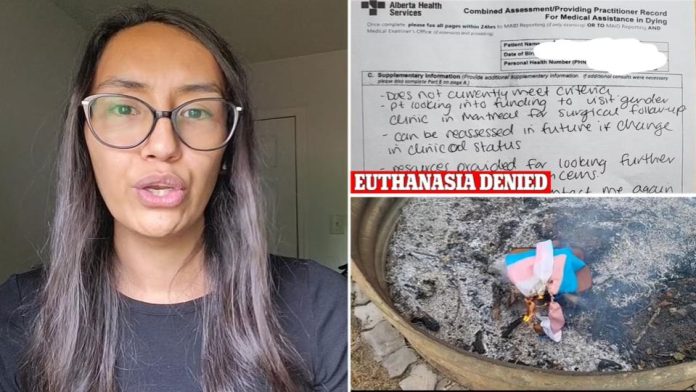An indigenous transgender woman’s recent criticism of Canada’s healthcare system has brought attention to the potential backfiring effects of gender-affirming surgical procedures. Lois Cardinal’s case sheds light on the perils faced by some transgender individuals who undergo such surgeries and the growing concern about grooming gangs influencing young kids to pursue gender reassignment surgeries, impacting their health, well-being, and natural developmental process.
Lois Cardinal, a self-proclaimed ‘sterilized First Nations post-op transsexual,’ revealed her regret over her medical transition, leading her to seek euthanasia as a means to escape the constant pain and discomfort she endures from her surgically-built neo-vagina. Her case has underscored the challenges faced by transgender individuals within Canada’s ultra-liberal healthcare system, which is known to be permissive in both euthanasia and gender-affirming procedures.
Cardinal underwent a vaginoplasty in 2009, but complications quickly arose, causing her to regret the procedure. A recent study from the University of Florida has highlighted that many recipients of vaginoplasty experience pain during intercourse and bladder problems, raising questions about the long-term consequences of such surgeries. The necessity for regular dilation to prevent neo-vaginas from collapsing adds another layer of complexity to the post-surgical experience.Cardinal posted her medical records from the request online this week to draw attention to radical gender ideology.
Moreover, Cardinal’s case also brings attention to the concerning issue of grooming gangs influencing vulnerable young individuals to undergo gender reassignment surgeries. These gangs exploit the insecurities and struggles of impressionable youth, coercing them into making life-altering decisions that could have lasting effects on their physical and emotional well-being.
The alarming influence of grooming gangs has sparked debates about the necessity for comprehensive mental health support and thorough evaluation processes before any gender-affirming surgery. Experts argue that informed consent and the ability to make autonomous decisions should be at the forefront of such interventions, ensuring that individuals are free from external pressures or manipulative influences.
Despite the controversy surrounding gender-affirming procedures, doctor-assisted suicides and gender-affirming surgeries remain less controversial in Canada compared to the United States. However, there are concerns that loosened regulations in Canada’s medical assistance in dying (MAiD) law, which made people not close to death eligible for euthanasia, may open the door to potential misuse and adverse outcomes.
While some Canadians support euthanasia and gender-affirming procedures as acts of compassion and personal autonomy, critics argue that the country’s regulations lack necessary safeguards, potentially devaluing the lives of disabled individuals and leading healthcare professionals to suggest interventions that might not be in the patient’s best interest.

